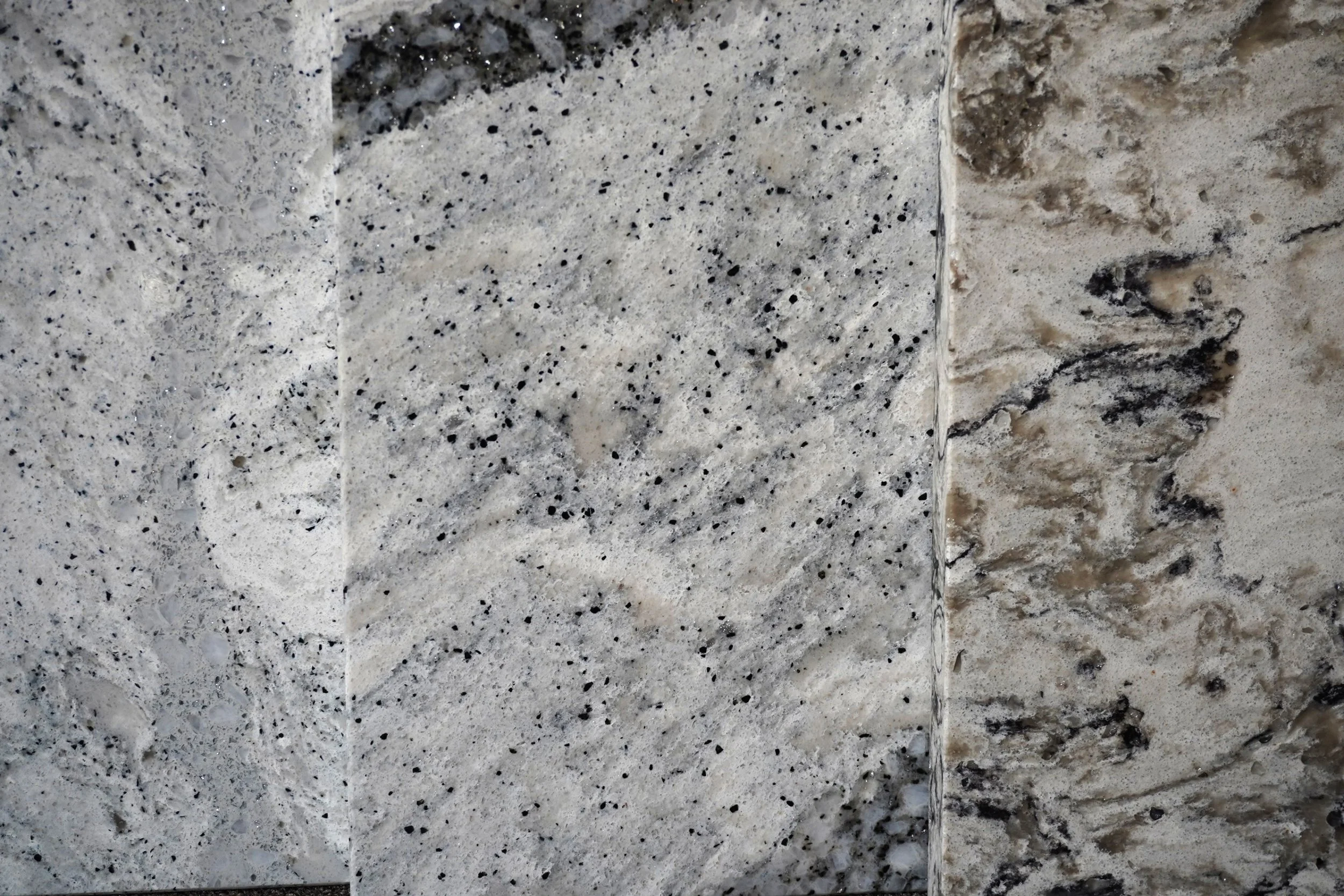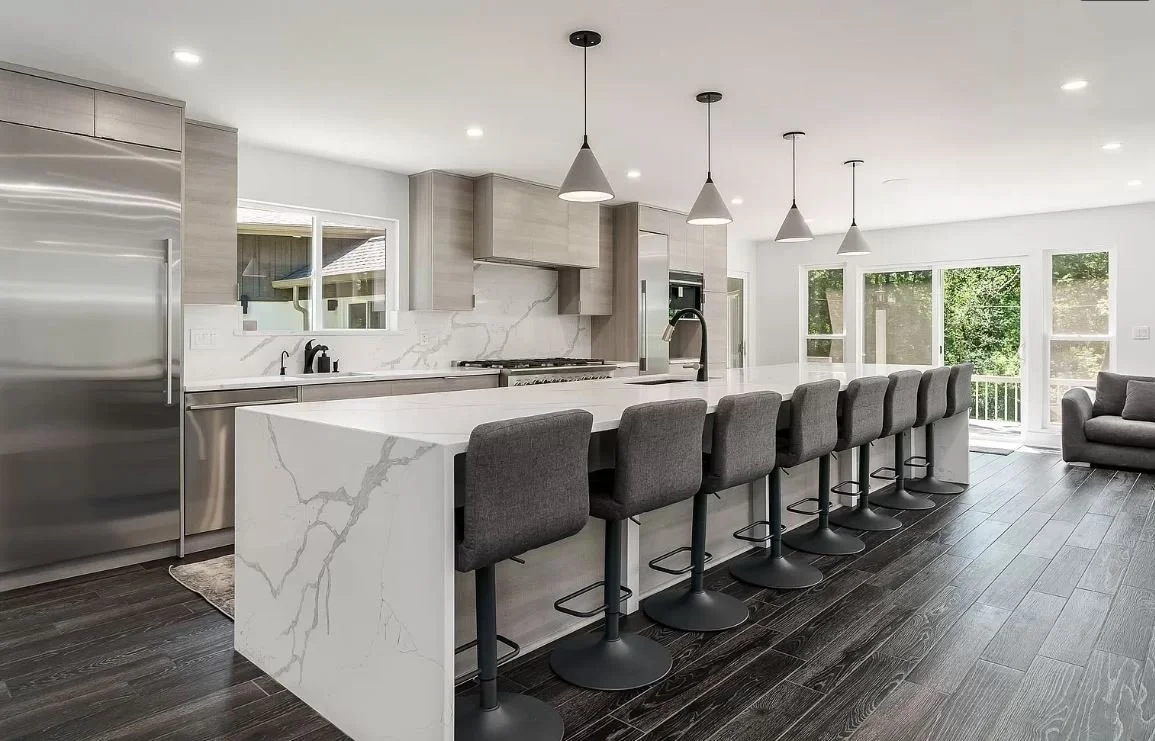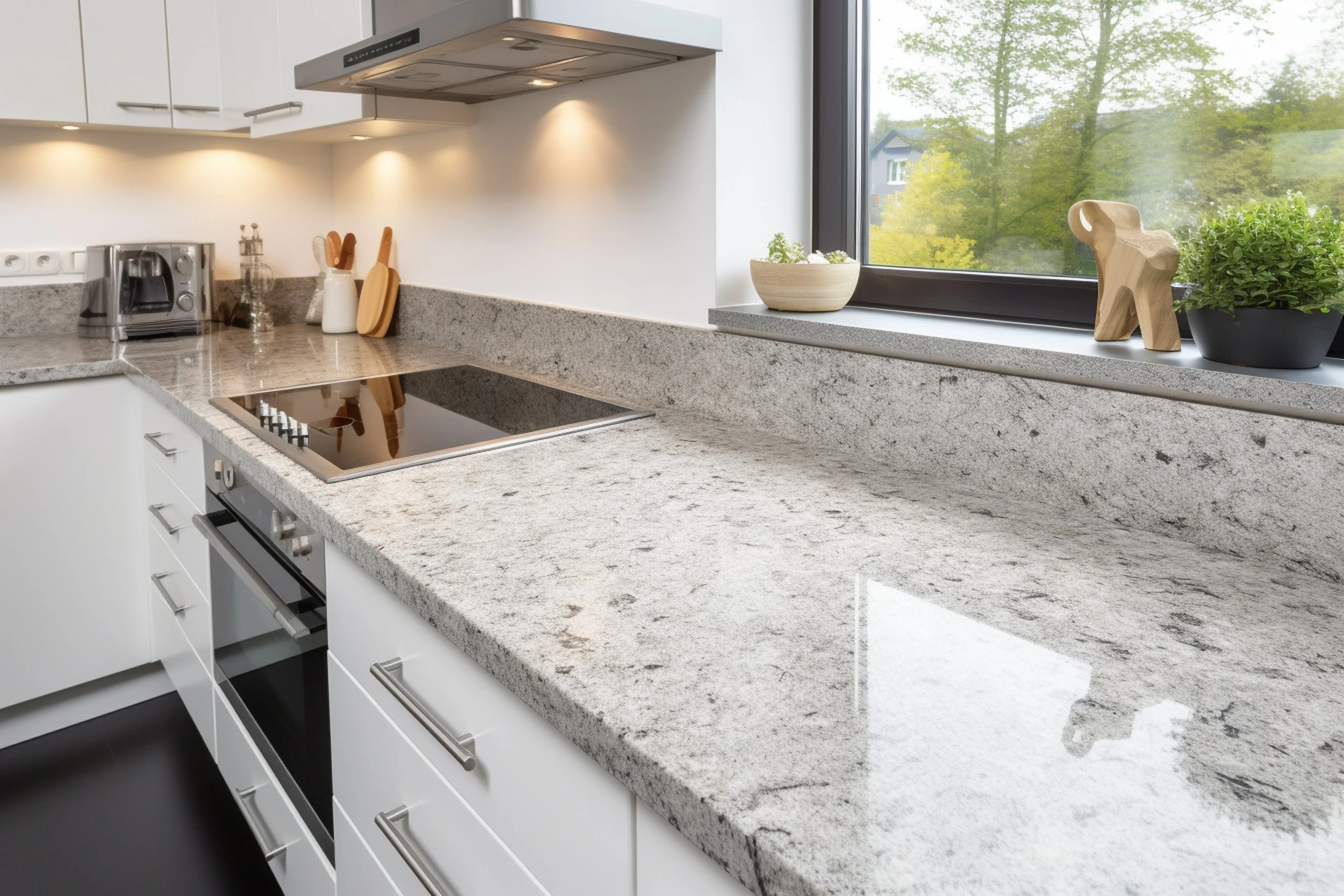High Quality Granite & Quartz Countertops at Unbeatable Prices
Elevate your home with stunning quartz, granite, solid surface, and laminate kitchen and bath countertops.
Whether you prefer the timeless beauty of natural stone or the sleek durability of quartz, we have the ideal countertop surface to match your style and needs. No matter your preference, from solid surface to epoxy, we offer expertly crafted surfaces to complete your dream kitchen or bath at the quickest turnaround and lowest price.
18 Months
0% Interest Financing
Granite Countertops Starting at $39 Per Square Foot
Quartz Countertops Starting at $49 Per Square Foot
Trust Andco for Your Kitchen & Bath Countertops
At Andco Kitchens & Baths, we offer a curated selection of premium kitchen and bath countertop materials, including granite, quartz, and more. When you purchase your stone from us, you’re getting top-quality materials that fit your exact specifications.
Unlike many other suppliers, we handle the fabrication of our stone in-house, giving us control over the entire process and ensuring precision and durability. We guarantee quick turnaround times without compromising on the quality of your countertops, giving you a beautiful, reliable surface for your home.
Granite vs Quartz
-
Granite is a 100% natural stone primarily composed of quartz, feldspar, and mica. It forms when magma slowly cools and crystallizes underground. Mined from quarries worldwide, it is then cut into slabs and shipped to distribution centers.
Quartz is an engineered stone consisting of approximately 95% crushed natural quartz and 5% polymer resins.
-
Granite is naturally formed, making each slab one of a kind. While samples provide a general idea of color, clients typically select their own countertop slabs. However, some natural variations—such as bold streaks—may only become visible after fabrication and polishing.
Quartz countertops are engineered, resulting in a much more consistent appearance.
-
Granite is generally more affordable than quartz. The price per square foot varies by color and depends on the number of slabs required. Using remnants can reduce costs for smaller projects, though color options may be limited.
Quartz is an engineered product and is typically more expensive. Its cost is influenced by the brand, design complexity, and composition, with some high-end quartz options rivaling the price of premium granite. However, its durability, low maintenance, and consistent appearance make it a popular choice despite the higher price point.
-
Granite is a porous material, meaning it can absorb water, liquids, and bacteria. It is susceptible to darkening, staining, and chipping, so special care may be needed. Sealing once a year—or whenever water no longer beads on the surface—is recommended. Daily cleaning and regular use of a granite cleaner help maintain its polished look.
Quartz is non-porous, requiring no sealing or special maintenance beyond regular cleaning. It resists stains and chips, making it a durable and low-maintenance option.
-
Granite is a durable material that resists heat. However, because it is porous, unattended spills or liquids can cause ring marks or stains. To maintain its appearance and longevity, protect your countertop from bacteria, accidental chips, and damage.
Quartz is harder than granite, making this type of countertop less prone to chipping. Its non-porous surface resists bacteria, but it can be damaged by excessive heat, so using trivets or hot pads is recommended.
Precision, Speed & Craftsmanship in Countertops
At Andco Kitchen & Baths, we ensure your custom countertops are crafted and installed with unmatched quality. Our in-house fabrication allows us to deliver precision-cut surfaces with the fastest turnaround times in the industry. From selection to installation, our team is committed to making the process seamless, stress-free, and tailored to your needs.

Your Path to a Stunning Remodel
Step 1
Select Your Stone
Explore our wide range of granite and quartz countertop options and choose the perfect color and pattern to enhance for your kitchen or bathroom.
Step 2
Measure & Fabricate
Once you’ve selected your material, we’ll take precise on-site measurements and expertly custom-cut your countertops for a flawless fit.
Step 3
Install & Enjoy Your Counters
Our professional team installs your countertops with expert accuracy and care, giving you a durable and beautiful surface to enjoy for years.
The Home You’ve Imagined Starts At Andco
Your countertops should reflect your style and support your lifestyle. From natural stone to engineered surfaces, we’ll help you weigh the pros and cons of your kitchen or bath countertops based on your space, lifestyle, and budget. Visit our Rockford, Aurora or St. Charles showrooms to explore your options and get started today. And read the Andco blog for design inspiration, remodeling tips, and expert insights
Cambria Countertops
How to Maintain Granite

FAQs
-
Granite: Known for its durability and natural beauty, granite is heat-resistant and comes in a variety of colors.
Quartz: A man-made material that's durable, low-maintenance, and available in many colors and patterns.
Butcher Block: Wooden counters that add warmth and are great for prep spaces, though they require maintenance to prevent stains and scratches.
Laminate: A budget-friendly, versatile material that comes in many colors and patterns but may not be as durable as stone.
Solid Surface (e.g. Corian): Seamless, easy to maintain, and repairable, but can be scratched more easily than stone.
-
Granite/Quartz: Clean with mild soap and water. Avoid harsh chemicals. Granite may need resealing every 1-2 years.
Butcher Block: Regularly oil with food-safe mineral oil to prevent drying and cracking. Clean with mild soap and water.
Laminate: Clean with a damp cloth. Avoid abrasive pads, as they can scratch the surface.
-
Granite/Quartz: Typically last 20+ years if properly maintained.
Butcher Block: Lasts 10-20 years depending on care.
Laminate: May last 10-15 years, depending on usage and care.
-
Yes! Granite countertops can withstand high temperatures, though it's always a good idea to use trivets or hot pads to avoid thermal shock (which can cause cracks or discoloration in extreme cases).
-
Granite is a natural stone, and each slab is unique. It requires sealing to maintain its appearance.
Quartz is engineered, made from natural stone and resin. It's non-porous, easier to maintain, and available in more uniform patterns.
-
Laminate: $20 to $50 per square foot.
Butcher Block: $30 to $100 per square foot.
Granite: $39 to $150 per square foot, depending on the type.
Quartz: $49 to $200 per square foot.
Prices can vary depending on the size of your project, material quality, and installation costs.
-
Marble is beautiful and timeless, but it is porous and can stain easily (especially with acidic liquids like wine or lemon juice). It's more commonly used in bathrooms or as a decorative feature in kitchens, but it can work if you don't mind the extra maintenance.
-
Granite/Quartz: Scratches can be fixed, but it usually requires professional help. Some quartz brands offer repair kits.
Butcher Block: Scratches can be sanded out and oiled.
Laminate: Minor scratches can sometimes be repaired with special fillers or a laminate repair kit.
Concrete: Small cracks can be filled and resurfaced.
-
Quartz: Durable, non-porous, and easy to maintain, making it great for busy families.
Granite: Offers heat resistance and durability, though it requires sealing.
Butcher Block: Adds warmth and works well if you like prepping food directly on the counter.
Solid Surface (e.g. Corian): Easy to clean, seamless, and scratch-resistant.
-
Granite and Quartz are among the most durable options, resisting scratching, staining, and heat to a large extent. Concrete is also durable but needs regular maintenance.
-
Granite: Generally heat-resistant, but it's still a good idea to use trivets for extreme heat.
Quartz: Not as heat-resistant as granite, and too much heat can cause cracking.
Marble: Sensitive to heat and can discolor or crack.
Butcher Block: Heat can damage the wood, so always use pads or trivets.
Concrete: Can withstand heat, but high temperatures can leave marks or cracks.





